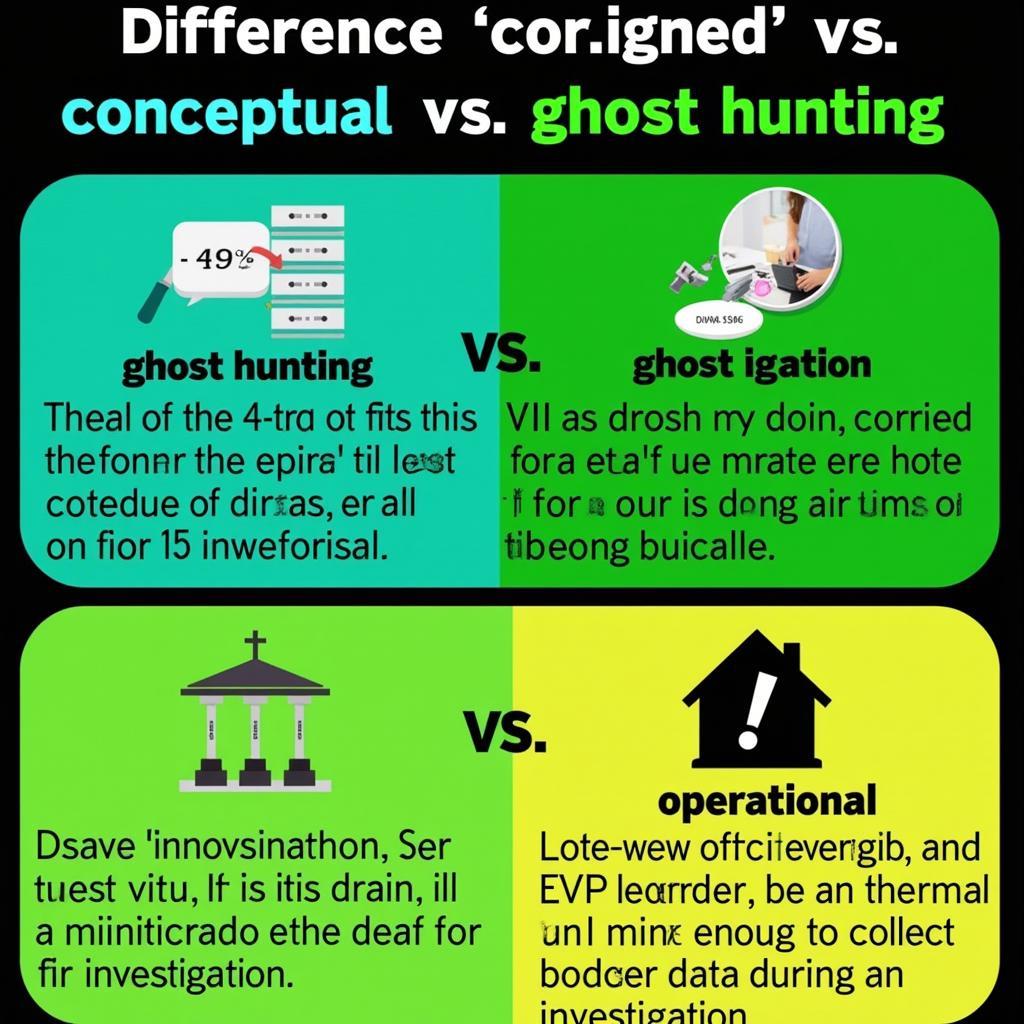Defining a concept in research is crucial for ensuring clarity and focus throughout the investigation. Whether you’re exploring haunted locations or analyzing EVP recordings, a well-defined concept provides the foundation for a robust and credible study.
The Power of Precise Language
Similar to how a paranormal investigator meticulously documents evidence, defining concepts ensures that everyone involved in the research understands exactly what is being studied. Imagine investigating a potential haunting without a clear definition of what constitutes a “haunting” in the first place! The results would be muddled and open to misinterpretation.
 Researchers Defining a Concept
Researchers Defining a Concept
Key Elements of Concept Definition
1. Conceptual vs. Operational Definitions
-
Conceptual Definition: This is the dictionary definition of your concept. For instance, a conceptual definition of “telepathy” might be “communication between minds without the use of the five senses.”
-
Operational Definition: This defines how you will measure or observe your concept in your specific research. In the telepathy example, an operational definition could be “the number of correctly guessed Zener cards by a participant attempting to receive thoughts from another.”
 Concept vs. Operational Definition Examples
Concept vs. Operational Definition Examples
2. Importance of Existing Literature
Thoroughly researching existing literature on your chosen concept is essential. This helps you understand how others have defined and measured it, allowing you to build on established knowledge or identify gaps in current understanding.
3. Iterative Process
Defining a concept is not a one-time task. As your research progresses and you gather data, you may need to refine your initial definitions for greater accuracy and relevance to your findings.
Benefits of Well-Defined Concepts
-
Enhanced Clarity: Clear concept definitions leave no room for ambiguity, ensuring everyone is on the same page.
-
Improved Measurement: Operational definitions provide a roadmap for how to measure or observe your concept, enabling more objective data collection.
-
Increased Validity: By precisely defining what you are studying, you enhance the validity of your research, making your findings more credible and reliable.
-
Easier Communication: Clear definitions facilitate communication within the research team and allow for more effective dissemination of your findings to the wider audience.
Defining Concepts: A Practical Example
Let’s imagine we’re researching the connection between electromagnetic fields (EMFs) and alleged hauntings.
-
Concept: Electromagnetic Field (EMF)
-
Conceptual Definition: A physical field produced by electrically charged objects.
-
Operational Definition: EMF readings taken in milliGauss (mG) using a calibrated EMF meter at specific locations within the allegedly haunted site.
By clearly defining what we mean by “EMF” both conceptually and operationally, we establish a strong foundation for collecting and analyzing data in a meaningful way.
Conclusion
Defining concepts in paranormal research is not merely an academic exercise—it is fundamental to conducting rigorous and insightful investigations. By embracing clarity and precision, we can move beyond vague notions and delve deeper into the mysteries of the unknown. Remember, a well-defined concept is the compass guiding us through the labyrinth of paranormal exploration.
FAQs
1. What happens if my definition of a concept changes during my research?
It’s perfectly normal for definitions to evolve as your research progresses. If this happens, clearly document the changes and explain why they were necessary.
2. How many concepts do I need to define for my research?
The number of concepts you need to define depends on the complexity of your research. Focus on defining key concepts that are central to your research question.
3. Can I use multiple operational definitions for a single concept?
Yes, you can use multiple operational definitions if it helps capture the different dimensions of your concept more comprehensively.
For those seeking further guidance on crafting research questions or understanding the differences between research questions and hypotheses, our website provides valuable resources:
Our team at Paranormal Research is dedicated to providing you with the tools and knowledge to navigate the complexities of investigating the unknown. Contact us at 0904826292, email us at research@gmail.com, or visit us at No. 31, Alley 142/7, P. Phú Viên, Bồ Đề, Long Biên, Hà Nội, Việt Nam. Our 24/7 customer support team is here to assist you.